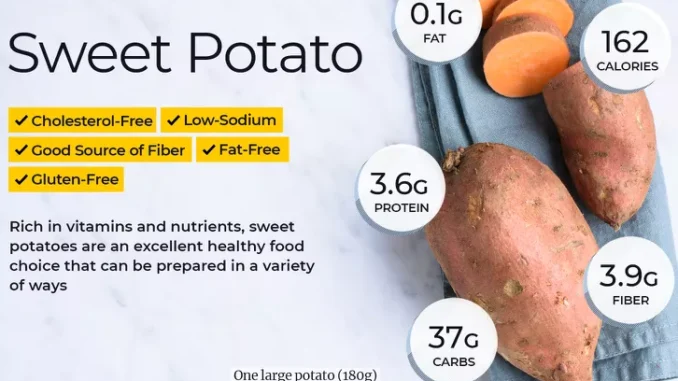
Sweet Potato Nutrition: The Ultimate Guide to Health Benefits
Sweet potatoes have long been a staple in diets around the world, from savory side dishes to comforting desserts. But beyond their delicious flavor and versatility, these vibrant root vegetables are a nutritional powerhouse. In a world where “superfoods” are constantly being marketed, the humble sweet potato stands out as a true champion of health. This comprehensive guide will take a deep dive into Sweet Potato Nutrition, exploring the myriad of health benefits that make this vegetable a must-have in your diet.
The Nutritional Breakdown: What Makes Sweet Potatoes So Healthy?
To truly appreciate the health benefits of sweet potatoes, we must first understand their nutritional composition. Sweet Potato Nutrition is impressive, offering a rich source of vitamins, minerals, and other beneficial compounds. A medium-sized sweet potato (about 150-200 grams) contains:
- High in Beta-Carotene: The vibrant orange color of sweet potatoes is a clear indicator of their high beta-carotene content. This powerful antioxidant is converted into Vitamin A in the body, which is crucial for vision, immune function, and skin health.
- Excellent Source of Vitamin C: Sweet potatoes provide a significant amount of Vitamin C, another potent antioxidant that supports the immune system, promotes collagen production for healthy skin, and aids in iron absorption.
- Rich in Manganese: This essential mineral plays a vital role in bone health, metabolism, and the formation of connective tissues.
- Good Source of B Vitamins: Sweet potatoes contain several B vitamins, including B6 and B5, which are important for energy metabolism and nervous system function.
- Potassium: This mineral is vital for maintaining healthy blood pressure, fluid balance, and muscle function.
- Dietary Fiber: With both soluble and insoluble fiber, sweet potatoes support digestive health, promote a feeling of fullness, and help regulate blood sugar levels.
READ ALSO Egg Nutrition: Your Ultimate Guide to a Protein Powerhouse
The Health Benefits: A Deep Dive into Sweet Potato Nutrition
The impressive nutritional profile of sweet potatoes translates into a wide array of health benefits. Let’s explore some of the key advantages of making this vegetable a regular part of your meals.
1. Vision Health: The high beta-carotene content of sweet potatoes is a game-changer for eye health. As mentioned, beta-carotene is converted into Vitamin A, a nutrient essential for good vision, particularly in low light. It also helps protect the surface of the eye and is known to reduce the risk of age-related macular degeneration (AMD).
2. Boosting the Immune System: The combination of beta-carotene, Vitamin C, and other antioxidants in sweet potatoes makes them a fantastic food for strengthening the immune system. These antioxidants fight free radicals, which can cause cellular damage and inflammation. A strong immune system is our best defense against infections and diseases.
3. Anti-Inflammatory Properties: Chronic inflammation is at the root of many modern diseases, including heart disease, diabetes, and certain cancers. The antioxidants present in sweet potatoes, such as anthocyanins (found in purple-fleshed varieties), have potent anti-inflammatory effects. Regularly consuming sweet potatoes can help reduce inflammation throughout the body.

4. Digestive Health: The fiber content of sweet potatoes is a major win for your gut. The insoluble fiber adds bulk to stool, which helps prevent constipation and promotes regular bowel movements. The soluble fiber, on the other hand, feeds the good bacteria in your gut, contributing to a healthy gut microbiome. A balanced gut is linked to improved digestion, mood, and overall health.
5. Blood Sugar Regulation: Despite their name, sweet potatoes have a moderate glycemic index (GI), especially when compared to white potatoes. The fiber in sweet potatoes slows down the absorption of sugar into the bloodstream, preventing sharp spikes in blood sugar levels. This makes them a great choice for individuals looking to manage or prevent type 2 diabetes.
6. Heart Health: The potassium in sweet potatoes is crucial for maintaining healthy blood pressure. Potassium helps balance the negative effects of sodium, which is often consumed in excess in modern diets. Additionally, the fiber and antioxidants in sweet potatoes can help lower “bad” LDL cholesterol levels and reduce oxidative stress, both of which are risk factors for heart disease.
7. Weight Management: Sweet potatoes are a satisfying and nutrient-dense carbohydrate. The fiber and water content contribute to a feeling of fullness, which can help reduce overall calorie intake and prevent overeating. Substituting refined carbs with sweet potatoes is a simple and effective strategy for weight management.
8. Cognitive Function: The antioxidants in sweet potatoes, particularly those found in purple varieties, can protect brain cells from damage. Some studies suggest that the anthocyanins in purple sweet potatoes can improve memory and learning. Furthermore, the B vitamins and potassium support overall brain health and nerve function.
Beyond the Basics: Understanding Different Varieties
While the most common sweet potato is the orange-fleshed variety, there are many other types, each with its own unique flavor profile and nutritional benefits.
- Purple Sweet Potatoes: These are particularly rich in anthocyanins, powerful antioxidants that give them their vibrant color. They have been studied for their potential benefits in cancer prevention and cognitive health.
- White Sweet Potatoes: These have a drier texture and a less sweet, more savory flavor. They are also a great source of fiber and potassium.
- Japanese Sweet Potatoes: Known for their purplish-red skin and yellow flesh, these have a chestnut-like flavor and are a good source of fiber and vitamins.
How to Maximize the Benefits of Sweet Potato Nutrition

To get the most out of Sweet Potato Nutrition, consider these tips for preparation and consumption:
- Leave the Skin On: The skin of the sweet potato is a significant source of fiber and nutrients. A simple scrub is all that’s needed before cooking.
- Roast, Steam, or Bake: These methods of cooking are the best for preserving nutrients. Frying in oil can add unhealthy fats and reduce the nutritional value.
- Pair with a Healthy Fat: The beta-carotene in sweet potatoes is a fat-soluble vitamin, meaning it is better absorbed when consumed with a healthy fat. Drizzle your cooked sweet potato with a little olive oil, or serve it alongside avocado or nuts.
- Use in a Variety of Dishes: From savory fries and roasted cubes to sweet potato toast and baked goods, there are endless ways to incorporate this vegetable into your diet.
Conclusion: The Sweet Potato is a True Superfood
In summary, the sweet potato is far more than just a simple side dish. Its rich and diverse nutritional profile, packed with vitamins, minerals, and antioxidants, offers a wide range of health benefits from improving vision and boosting immunity to supporting heart and digestive health. By making Sweet Potato Nutrition a priority, you can easily and deliciously enhance your well-being and enjoy the many advantages this versatile and healthful vegetable has to offer. So next time you’re at the grocery store, don’t hesitate to grab a few—your body will thank you.

Leave a Reply